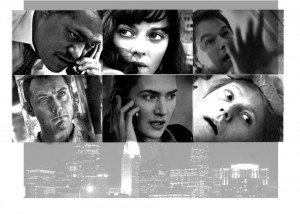Contagion instills lasting sense of fear
“The only thing we have to fear is fear itself,” Franklin D. Roosevelt said in his famous inaugural address.
Still, a mysterious and uncontrollably contagious illness spreading across the planet is probably an exception to Roosevelt’s advice.
Director Steven Soderbergh’s new film Contagion chronicles just that, and in the process examines just how the SARS-like disease featured in the film affects not only our immune systems but our psyches.
As an exercise in plot, Contagion is surprisingly demure. There’s none of the iconic storylines that one would expect to find in the infection-thriller genre: no apocalyptic destruction of cities, no epic escape for survival, no sinister military involvement and no miraculous cure to save the planet.
In fact, the story is so simple that it would be easy to mistake the film itself for simple. Where Soderbergh’s feature shines is in the details — in the quiet moments and the conundrums Contagion’s characters are forced to navigate.
The disaster starts with Beth Emhoff (Gwyneth Paltrow), who becomes the first victim of a disease that soon begins appearing in populations all across the world.
Woven through this initial premise are stories of numerous characters who all play crucial roles in revealing the facets of the disaster. There’s Mitch Emhoff (Matt Damon), Beth Emhoff’s husband; Dr. Erin Mears (Kate Winslet), who is tasked with uncovering what the illness actually is; and Alan Krumwiede (Jude Law) as the constantly paranoid conspiracy blogger, intent to reveal the government’s supposed corruption in dealing with the pandemic.
Lawrence Fishburne makes an appearance as the composed Dr. Ellis Cheever, a higher-up at the Center for Disease Control and Prevention. And Marion Cotillard stars as a World Health Organization official, sent to China to find the source of the disease.
What helps Soderbergh’s vision come to life onscreen is the collective ability of this cast, which happens to be a revelation.
Soderberg’s similarly star-studded ensemble cast in the Ocean’s Eleven series took advantage of their statuses, playing up the group dynamics and having fun. In Contagion, however, the cast melts into the woodwork of the story with subtlety. Soderbergh’s adroit directorial touch insists that you never end up conscious of who’s onscreen, even though every performance — and that’s no exaggeration — is convincing to the core. This is part of why the film works so well.
An even bigger aspect of the film’s success is how Soderbergh manages to pace and uncoil the mystery surrounding the disease. Contagion builds slowly — slowly enough that it might frustrate some viewers — and the divergent storylines of the various characters mean the film never really hits a smooth stride. Instead, the story tumbles forward, bouncing between characters and moments at will.
Thankfully, these moments happen to be well-crafted and cleverly run the gamut of experience one might expect in an epidemic scenario. The struggles of Mitch Emhoff as he attempts to balance his grief and his role as a father to his daughter play beautifully next to the loftier problems of the CDC’s Cheever. Even the annoying, smirking Krumweide’s storyline works brilliantly, toying with people’s paranoid fears of governmental secrets and inside dealing.
More than anything, Contagion succeeds because of its understated nature. Where 1995’s Outbreak terrorized with an exotic, critically fatal disease and the threat of military destruction, Contagion’s scares are far more cloaked and insidious. The way Soderbergh re-frames the ordinary into the deadly — coughing on a bus, a stray handshake, and a well-used doorknob — is ingenious.
In that sense, Contagion is less about a disease and more about the toxic fear it can cause — and how that fear can spread like wildfire, causing us to behave and think in ways we would never otherwise behave. While a fast-spreading disease of unknown providence is a horrifying notion, it might just be even more terrifying to take note of how panic can destroy us too.
Maybe Roosevelt was correct after all. Being fearful can be deadly.
And what a coincidence: Contagion will leave you scared like no other recent movie can.
